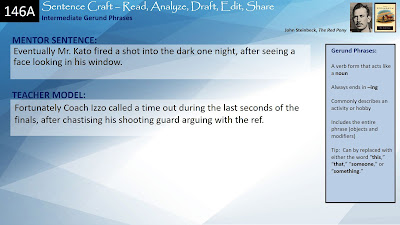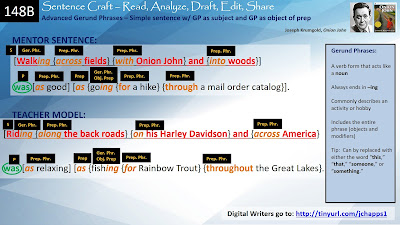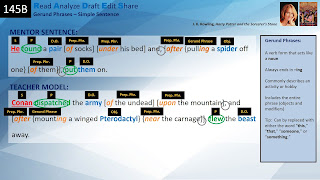Friday, May 31, 2019
Tuesday, May 28, 2019
Another Great Article on Grammar
The Wrong Way to Teach Grammar
EXCERPT:
"Happily, there are solutions. Just as we teach children how to ride bikes by putting them on a bicycle, we need to teach students how to write grammatically by letting them write. Once students get ideas they care about onto the page, they are ready for instruction—including grammar instruction—that will help communicate those ideas... students immediately apply to their own writing, and having students play with sentences like Legos, combining basic sentences into more complex ones. Often, surprisingly little formal grammar instruction is needed.... many errors “disappear” from student writing when students focus on their ideas and stop “trying to ‘sound correct.’”"
https://www.theatlantic.com/education/archive/2014/02/the-wrong-way-to-teach-grammar/284014/
Why Grammar Matters
One comma, or lack thereof, cost a company millions of dollars.
https://www.nytimes.com/2017/03/16/us/oxford-comma-lawsuit.html
Creative Paragraph #9 Directions
DUE: Monday, 6/3/19 by 3:15 pm
Choose one of the following writing prompts to write a free paragraph (grammar, spelling, and punctuation do not count).
Have a minimum of 400 words -- type the word count at the top of the document.
Include at least one original gerund phrase. Underline it. You may use one of the your original sentence from your sentence composing journal, or you may create a new one.
Here are the two prompts to choose from:
TITLE: Favorite Music
PROMPT: Imagine that you are listening to your favorite music. Write a descriptive
paragraph about this music. Describe how it makes you feel. Also include what the
music would be like if you could see it, touch it, smell it, or taste it. Use
your imagination. Give lots of details so that the reader can share your
impressions.
TITLE: Your Own Superhero
PROMPT: There are
dozens of superheroes in comic strips and in movies. Some can fly, some can run
faster than humans, and some have enormous strength. Imagine a new, original
superhero. How could this superhero be described? What special powers would he
or she have, and where did the superhero get those powers? How would he or she
look? Does your superhero have a special hideout and equipment? And, of course,
don't forget to describe your superhero's costume!
Sentence Composing Journals #101 - #150
DUE DATE: Thursday, 5/30/19 at 3:15 pm
WORTH: 50 points
Students will turn in a Google Document to Turnitin.com of their own original sentences from their sentence composing journals numbered #101 - #150. This is the work that was done in class as part of our daily writing exercises.
DO NOT include the Mentor Sentence or Teacher Models. Only include your original work.
Number each sentence and put a space between them like this:
#101 Here is your sentence.
#102 Here is another sentence.
#103 And so on.
Thursday, May 23, 2019
Harvard Business Review Article on the Importance of Grammar
I Won't Hire People Who Use Poor Grammar. Here's Why.
by Kyle Weins
https://hbr.org/2012/07/i-wont-hire-people-who-use-poo
Wednesday, May 22, 2019
Anne Frank Screening Day 3 - Discussion Questions
1) Why do you think Mrs. Frank lied to Margot and said that Otto had received the summons but not Margot?
2) Why do you think the Van Daan’s are called the Van Pelts, and Mr. Dussell is called Mr. Pfieffer, and the cat’s names are switched?
3) Once they are in the Annex, how are the major events different between the play and the movie? More specifically, the arrival of the Van Danns and Mr. Dussel? Why do you think the screenwriters and playwrights made these different decisions for their narratives?
Tuesday, May 21, 2019
Anne Frank Screening Day 2 - Discussion Questions
1) Why did Miep agree to help Mr. Frank when he asked her? More specifically, what clues from her past stories or behavior may have made her someone willing to risk herself for others?
2) How was Anne’s story, “Mrs. Quack-Quack,” received by her peers at first? What were the unexpected results of her having shared her story?
3) When Mr. Frank purchased the Annex for his business, what was the original, what was it originally to be used for?
Monday, May 20, 2019
Anne Frank Screening Day 1 - Discussion Questions
1) What adjectives would you use to describe Anne at the beginning of the movie?
2) Does how Anne Frank behave at the beginning? Does this fit with your argument of whether or not she changed by the end of the play?
3) What are the reasons why Otto Frank, Anne’s father, didn’t leave Amsterdam before the Nazi occupation?
Friday, May 17, 2019
Thursday, May 16, 2019
Final Exam Micro CERS+ Anne Frank Checklist
Final Micro CERS plus Checklist
___ FONT: Default Arial 14, Include your own name and title
___ Include name and hour.
___ Double sided is okay.
___ Include name and hour.
___ Double sided is okay.
___ Submit digitally to Turnitin.com
___ Submit hard copy stapled in this order:
1 - On top: Your Hard Copy of Anne Frank
2 - Below: Your Outsiders Packet
___ Does the physical format appear to be the same as the teacher model?
___ Did I go through the checkbric one element at a time to check my work?
___ Did I review my extra credit reflection to make sure that I didn’t make the same mistake this time?
___ Did I use spell check to check my spelling?
___ Did I make sure not to use informal voice, avoiding referring to myself or to addressing the reader directly (I, you, myself, we, etc.)?
___ Did I go use text-to-speech website to have my final essay read out loud to me to check for flow?
___ Am I proud that this represents some of the best work that I’ve done at Derby Middle School?
Wednesday, May 15, 2019
TOP 12 MOST COMMON MISTAKES ON CERS THAT YOU SHOULD AVOID
2. EVIDENCE DUMPING. Heaping on extra Evidence in your Reasoning is weak writing. You can provide additional information in your Reasoning only if it is related to your Evidence. But don’t use your Reasoning as a dumping ground for other stray ideas you didn’t get to. “And another thing… And another thing…” Instead, focus like a laser on the Evidence you did choose and explain the heck out of it.
3. REDUNDANCY. Filling space by repeating the same information is lame. Sometimes students will pad their writing in an effort to make it look like they wrote more than they really did. Each sentence should move the argument forward adding something new.
4. SKIPPING THE READ-ALOUD CHECK. 90% of sentence structure errors can be caught by simply reading your work out loud as it is exactly written on the page. You aren’t graded on what you thought you wrote, on what you intended to write, but on what you actually wrote. Take the time to read it out loud and see if anything needs to be fixed. You will instinctively “hear” if it makes sense and “feel” like there is way to change it to make it better.
5. TELLING YOU ARE TELLING. This isn’t meta. You don’t have to transition with telling the reader what you are doing. Just do it. For example, “Now that the evidence is covered, it’s time for the reasoning.”
6. SPECIFIC ALWAYS BEATS VAGUE. Avoid words like “stuff” and “things.” Be specific. Avoid words like “people.” Which people? Statements like “And then something happens…” What happened?
7. WEAK WORD CHOICES. Upgrade your word choices. Instead of “sick” be more specific with “heart attack.” Instead of “heart attack” use more expert language like “cardiac arrest.” Drill down into your word choices with control and precision.
8. FALSE FACTS. Make sure that what you write is true. Students sometimes stumble through their own essays in an effort to fill space, never stopping to check if what they’re writing actually makes sense. Weak writers sometimes make up facts because they didn’t do the work. Strong writers control the facts because they know what they’re talking about. If you don't remember, look it up! There are no shortcuts.
9. OVERCOMPENSATING. Sometimes students will go above and beyond to cover all of their bases but end up writing too much. While thoroughness is a virtue, brevity is the soul of wit. Less is more. Focus on being direct instead of talking around an idea. Focus on being quick and precise, not lumbering and clumsy. Get in, make your point, and get out. Be a laser or a scalpel, not a sledgehammer.
10. RISK-AVERSION. If you want to sound like everyone else, write like everyone else. Why not take chances? Be an original thinker. Here, the way to innovate is to stay within the structure provided, but demonstrate creative and original thinking in your choices. If you always go for the obvious -- plucking the lowest hanging fruit -- you may be safe for now, but you won’t stand out or be noticed. Fortune favors the bold. There’s room within this structure to think outside of the box and be innovate!
11. OVER CLOSING. Sometimes writers guilty of "And another thing... And another thing..." belabor the point by continuing the back-and-forth argument well into the Synthesis. At this point the argument should be "closed" and you should move on. The synthesis is a place to provide additional thoughts that bubbled up through the discussion. It is not a place to keep arguing.
12. CRAMMING IN MORE EVIDENCE. Sometimes students want to keep arguing their case by providing evidence beyond that which is required for the assignment. Some students may want to use a quote in the claim to establish the spirit of the source or narrative. Other writers may want to close the paper by using a quote in the Synthesis that summarizes what they think. These are good instincts and show creativity, but the purpose of the Micro CERS Plus structure is to limit the amount of evidence in order to focus on the thinking about that evidence. So, instead of adding other quotes, paraphrase these ideas or shift the focus towards the thinking and not the evidence-sharing.
Monday, May 13, 2019
MICRO CERS PLUS FINAL EXAM – TEACHER’S MODEL
NOTE: The following teacher model closely follows the pattern of the Micro CERS Plus checkbric that will be used in grading the students' final exam this year. It is an example of what A-level writing would look like for 8th grade. The topic is from a CERS prompt used several years ago.
CLAIM
During the 2014 Super Bowl, Coca-Cola premiered a controversial television commercial titled It’s Beautiful featuring young Americans singing the National Anthem in non-English languages such as Hebrew, Spanish, and Arabic. Images included showing two gay fathers roller skating with their young daughter and a beautiful, smiling young Muslim woman wearing a hijab. Although some might find this commercial to be an attack on American values, the truth is that Coca-Cola celebrated diversity by expressing the idea of what being an American means.
- Author, title, type of media
- Provides background information to orient the reader
- Turns the prompt into strong claim
EVIDENCE
In his editorial titled “America the Beautiful for the 21st Century,” columnist Raul Reyes points out that, “… the motto on the Great Seal of the United States [is]: E pluribus unum. It means ‘Out of many, one’ – and it’s in Latin,” (1).
- Uses a relevant quotation that sets up the Reasoning
- The choice of evidence is among the best, if not the best, from the options available
- The quotation is formatted correctly using an in-text citation
REASONING
In other words, baked into the very identity of the U.S.A. is the core concept of many different kinds of people becoming united. That motto is printed upon every American dollar and coin. It is enshrined upon the Presidential Seal where the President gives speeches. The fact that the motto is in Latin -- and not in English -- further recognizes that patriotism known no single language. For the record, Latin is typically associated with Spanish, French, and Italian. Coca-Cola is embracing the very idea of America by celebrating diversity in this commercial as a strength. The unmistakable lyrics and melody of the song unify people in a beautiful way that goes beyond language, race, or religion. Coke got it right. One can be pro-immigrant and pro-America at the same time.
- Uses logic to elaborate, explain, and give examples of what the evidence means
- Connects the evidence back to the claim
- Connects the evidence back to the claim
COUNTER CLAIM
Some would argue that in presenting the National Anthem with different foreign languages, Coca-Cola is dividing allegiances and making a symbolic attack on traditional (mostly white) English-speaking America.
- Provides a short counter claim that briefly states the opposing position
COUNTER REASONING
They might point out that the Founding Fathers deliberately chose for the nation to have only one national language: English. Language is identity. Coca-Cola may be seen as pandering to “political correctness” while further dividing the country by tarnishing the most sacred of songs. People cannot truly be one nation without having one language; and that’s English.
- Briefly elaborates and explains the opposition's rational and thinking behind their position
REBUTTAL
Where this argument goes astray is in how it dishonors many American’s parents, grandparents, and great grandparents. Unless someone’s ancestors were 100% British, those ancestors didn’t speak English. Were they not patriotic? Did grandpa hate America because he couldn’t speak English? Nonsense. The identities of people before they became U. S. citizens should be a point of pride -- not shame. There’s a connection between the children’s voices in the ad and many American families. Those singing kids are the same as most people’s grandparents. Coca-Cola never said not to learn English or that English is bad, but people will read whatever they want into something. The ad speaks for itself in reminding people that the love for one’s country goes beyond any one, single language.
- Without restating the original evidence or reasoning, addresses the counter claim and counter reasoning directly
- Attempts to point out a flaw in the logic of the opposition's perspective by using their own argument against them
- Attempts to point out a flaw in the logic of the opposition's perspective by using their own argument against them
SYNTHESIS
Coca-Cola did a great service to audiences watching the Super Bowl by reminding everyone what it means to be an American. Yet many folks worry that our nation is becoming too divided right now. More division is not helping. Perhaps Coca-Cola could have made a companion commercial that would have been a mirror of this one. It could have featured black-and-white footage of immigrants from Ellis Island coming to America, with elderly voices singing the National Anthem in their own foreign tongues such as Polish, German, French or Italian. That gentle reminder about respecting one’s heritage would have silenced the critics and have sent the point home without being inflammatory. Diversity does not have to be divisive.
- Restates the original claim in different words.
- Explores further questions or implications that bubbled up through the argument
- Explores a compromise or third option in order to go above and beyond instead of being trapped within the only two binary options
CONVENTIONS
- Avoids using informal style (I... you... we... us... our... etc.)
- Avoids run-on sentences, comma splices, and sentence fragments
- Sentences flow with clear, understandable meaning
- There is no "fluff" or "filler" with sentences just restating what was already stated elsewhere
Friday, May 10, 2019
Thursday, May 9, 2019
Washington D.C. Students
Just a heads' up: we finished The Diary of Anne Frank! The last two scenes are very short.
We will be doing the final exam next week, so if you can, try to finish reading Act 2 and be ready to discuss your final exam on Monday.
If you forgot your book in your locker, you can catch up on Monday night as homework. Don't stress about it. Just get it done when you get back.
Tuesday, May 7, 2019
Creative Paragraph #8
Due Wednesday 5/15/19 by 3:15 pm
Length: 400 words or more
Topic: Student choice, suggestion: transitioning from middle school to high school
Requirements: Include at least one underlined Participial Phrase (see #131-140) and at least one underlined Appositive Phrase (see #121-130).
EXTRA CREDIT OPTION:
If you wrote your participial phrases sentence composing with a continuous story from #131 - #139, you may submit that as an alternative.
Requirements: Label a parenthetical to show what sentence you imitated at the end of each sentence. For example: Sentence one (131). Sentence two (132). etc.
Also, you must name the file "EXTRA CREDIT PARAGRAPH 8" for me to find it and check it.
Monday, May 6, 2019
Friday, May 3, 2019
Subscribe to:
Comments (Atom)


















































